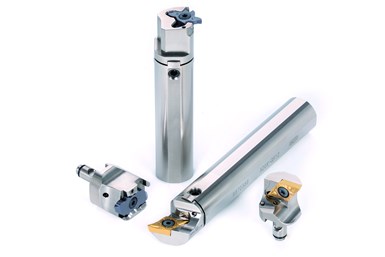Tungaloy Modular Turning System Provides High Repeatability
The ModuMiniTurn tool system incorporates a specialized coupling mechanism between the modular head and tool shank.
Tungaloy has updated its ModuMiniTurn modular turning-tool system for Swiss machines by adding 30 new, round-shank toolholders that are suitable for machining the back side of the parts in the subspindle.
The ModuMiniTurn modular turning tool system incorporates a specialized coupling mechanism between the modular head and tool shank, which reportedly achieves repeatability accuracy within the 5-μm range and minimizes downtime during tooling changeovers. The system offers standard modular heads for a range of applications, including forward turning, back turning, grooving, thread turning, parting and productive Y-axis turning.
The new round shank toolholders are designed to fit the cylindrical-shank toolholders in most Swiss-type lathes. Similar to existing ModuMiniTurn square-shank toolholders, the new round-shank toolholders also feature highly repeatable accuracy, reducing downtime.
The modular heads for the round-shank toolholders have a QR12 coupling connection and are available for forward turning, grooving and thread-turning applications. The forward-turning modular heads come in three standard cutting-angle styles: L for 95 degrees, U for 93 degrees and Q for 107.5 degrees, enabling operators to select optimal cutting angles for operations by swapping the modular cutting heads for the inserts.
The shank diameters are available in 16 mm (0.630″), 19.05 mm (0.75″) and 20 mm (0.787″).
RELATED CONTENT
-
Bar Feeder Basics
Some primary factors are often overlooked when considering how to justify the implementation of a bar feeder for turning operations.
-
Skiving Long, Slender Parts with Tight Tolerances
Here's a look at one of the oldest and most efficient methods of screw machine production for parts that are long and slender, with close-diameter tolerances and finishes, or parts that require truly spherical radii.
-
Advantages of Cellular Manufacturing
Manufacturing cells are used to minimize product movement as well as materials, equipment and labor during the manufacturing process. By reducing cycle times and material handling, these cells help shops more easily meet customer demands regarding cost, quality and leadtimes.






